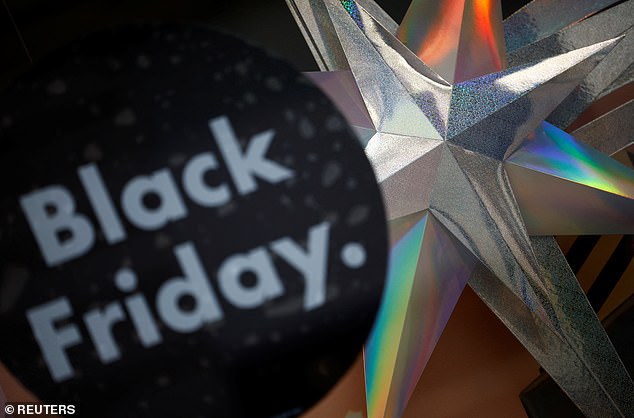The five sneakiest Black Friday SCAMS (and how to avoid them)
Black Friday is likely to be the busiest this week ever as millions of shoppers look for online bargains.
As many as three in five people will be looking for deals during the Black Friday sale.
But beware: today the boss of the bank Barclays is warning that an ‘unprecedented’ stream of scammers will try to prey on people looking for a bargain this year, especially online.
Risk analysts at data firm LexisNexis Risk Solutions say customers should prepare for an “onslaught of fraudulent attacks” as the Black Friday bonanza gets underway.
Here, Money Mail reveals the top five Black Friday scams to look out for – and how to protect yourself…
Scam threat: Shoppers have been told to prepare for an ‘onslaught of fraudulent attacks’ as the Black Friday bonanza gets under way
1. Scam with incorrect bank details
This growing scam involves fraudsters emailing shoppers to say there is a problem with their transaction that needs to be corrected immediately.
The email pretends to be from a store where you recently made your purchase and indicates that some of the billing information you provided is incorrect.
The scammer hopes that you will click on a link in the email to enter your banking information and other personal information. Once they have this, they can use it to make fraudulent transactions in your name.
Or they may contact you later claiming to be from the police, your bank or some other trusted authority and use the information you have provided to convince you that these are genuine.
These types of scams will be especially successful during Black Friday due to the large number of shoppers making purchases.
That’s because scammers often send the same fake email to tens of thousands of potential victims claiming to be from a major retailer.
If you haven’t purchased from that retailer recently, chances are you’ll ignore the email.
But if you do, it can strike a nerve and make you more likely to fall prey.
If a retailer urgently asks you to change your bank details and claims there is a risk of you missing out on an order you have placed, then you should be suspicious.
2. Counterfeit goods and purchasing fraud
With purchasing fraud, you pay for goods or services that are fake or never appear.
Shoppers are especially at risk of falling victim to Black Friday scams as they hunt for bargains and get good deals on Christmas presents for loved ones.
According to trade body UK Finance, more than one in four parents have been misled by purchasing scams in the past.
They are particularly sensitive because fraudsters often take advantage of the fact that many parents are trying to find a popular gift for their children.
Counterfeit items are usually advertised on Instagram or Facebook Marketplace. Money Mail is campaigning for social media companies to better protect users, and has revealed how easy it is for scammers to target victims on their platforms.
According to Lloyds Bank, the most common items in fake Black Friday ads or posts are Apple iPhones, Nintendo Switches, Nike trainers, PlayStations, Lego sets and drones.
Be wary of offers that seem too good to be true.
Check customer reviews of the seller to ensure it has a good track record.

Bargain hunters: As many as three in five people will be looking for deals during the Black Friday sale
3. Tracking number trick
In this type of scam, a fraudster sends fake text messages or emails with links, pretending to be from a retailer or carrier with fake package tracking information.
Scammers are taking advantage of the fact that consumers are likely to receive many packages at this time of year.
If you click the link or open the attachment, scammers can infect your device with malware or redirect you to fake websites where they can trick you into handing over your personal information.
Jodie Wilkinson, from card payments company TakePayments, said: ‘An influx of online orders on Black Friday could cause delivery delays.
Scammers can take advantage of this by sending delivery update emails with messages such as ‘There’s a problem with your delivery’ or ‘Click here for a delivery update’, with a link in a fraudulent email.”
Think carefully before clicking a link in an email.
4. Brute force computer attacks
According to LexisNexis Risk Solutions, retailers will see an increase in “brute force attacks” this year.
This is where fraudsters try to break into customer accounts by using technology that can attempt to guess their password and login details millions of times per second.
If a company you have an account with contacts you to say your password has been changed, tell the company immediately if it wasn’t you.
If you have a debit or credit card linked to that account, you can ask your bank to temporarily freeze it to prevent unauthorized payments.
5. Fake discount codes and offers
During Black Friday, consumers are bombarded with messages from retailers promising deals.
Scammers often copy these messages from big brand names. They send emails or text messages containing fake discount codes or links to fake websites.
If you want to take advantage of a Black Friday deal and aren’t sure if an offer you’ve seen is real, head straight to the retailer’s website.
We are prepared for gangs of criminals who target shoppers
By means of MAT HAMMERSTEIN CEO of Barclays UK

Watchful: Matt Hammerstein, the boss of Barclays UK
Finding that Black Friday deal online will be the highlight of the week for thousands of Barclays customers.
Unfortunately, the sheer number of shoppers looking for a bargain will attract an unprecedented number of criminals ready to scam them. We at Barclays, like other British banks, are braced.
We warn customers to be vigilant, but our data shows that money lost to purchase scams increased by 22 percent over the Black Friday and Cyber Monday weekend last year. Victims were robbed of an average of £970.
And it doesn’t stop there. Hundreds of millions of pounds are lost to fraud every year as a result of the coordinated attacks of organized crime gangs.
But efforts to prevent this crime lack the same coordination, with the government, regulators, the banks and technology companies working in silos.
This fragmented fight against fraud allows criminals to slip through the cracks and take advantage of the lack of data sharing between these different groups.
We fully support the Ny Breaking’s ‘Stop the Social Media Scammers’ campaign and urge the Prime Minister to bring together a united, cross-government group, endorsed by our new Home Secretary and the Chancellor , and bring together regulators, policymakers, industry groups and companies across sectors to effectively combat fraud.
Banks cannot win this battle alone. We need the government to look at how and where scams are happening.
Data from Barclays shows that nine in ten scams happen on technology platforms. Yet it is only banks that publicly publish fraud data.
We must work together to eradicate this criminal activity, which is harming countless individuals and endangering our economy and its future growth.
Organized criminal fraud gangs may be strong, but by working together, with the government in charge, we can be even stronger.
Some links in this article may be affiliate links. If you click on it, we may earn a small commission. That helps us fund This Is Money and keep it free to use. We do not write articles to promote products. We do not allow a commercial relationship to compromise our editorial independence.
